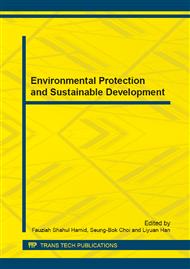p.1826
p.1831
p.1840
p.1844
p.1850
p.1853
p.1858
p.1871
p.1879
Research on Environmental Tax to Affect the Economic Development and GHG Mitigation in Beijing, China
Abstract:
As the most industrialized and urbanized region, Beijing plays as a demonstration role to show the impact of environmental policies on the economy development and GHG mitigation. In this paper, we constructed a dynamic input-output model introducing the different levels of environmental taxes. It not only can choose the optimal tax level, explore the relationships between economy and environment, but also can analyze the future trends of the economy and GHG intensity from 2010 to 2025. The objective function is the maximized GRP, subject to GHG emissions constraint and a series of subjective functions. The simulation results illustrated that with the GHG emissions constraint as 1.5 times of the 2010 level, carbon tax as 50 CNY/t CO2-e is effective to promote the economic development and GHG emissions mitigation. Annual growth rate of GRP can be up to 6.1%. The economic growth rate increases 0.3% compared with the condition when not introducing the policies. In 2025, the GHG intensity will be 43.5 t CO2-e/million CNY, 38.8% reduced compared with the 2010 level. This research proves that the proposed environmental tax is effective to promote the economic development and GHG mitigation.
Info:
Periodical:
Pages:
1871-1878
Citation:
Online since:
February 2014
Authors:
Price:
Сopyright:
© 2014 Trans Tech Publications Ltd. All Rights Reserved
Share:
Citation:


